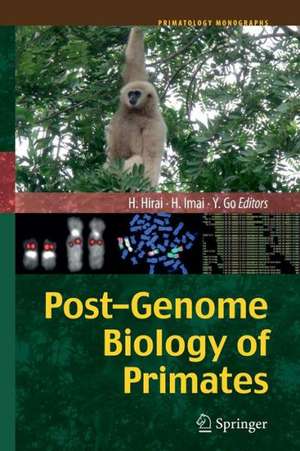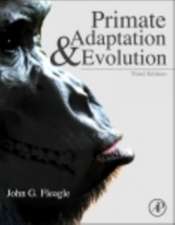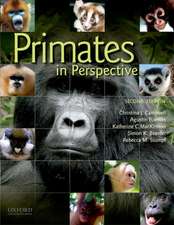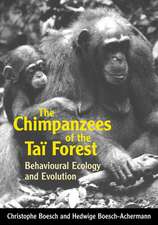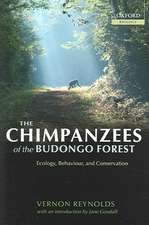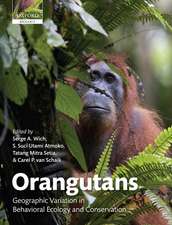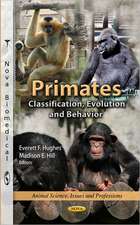Post-Genome Biology of Primates: Primatology Monographs
Editat de Hirohisa Hirai, Hiroo Imai, Yasuhiro Goen Limba Engleză Paperback – 16 apr 2014
| Toate formatele și edițiile | Preț | Express |
|---|---|---|
| Paperback (1) | 697.32 lei 6-8 săpt. | |
| Springer – 16 apr 2014 | 697.32 lei 6-8 săpt. | |
| Hardback (1) | 948.92 lei 6-8 săpt. | |
| Springer – 19 mar 2012 | 948.92 lei 6-8 săpt. |
Preț: 697.32 lei
Preț vechi: 820.38 lei
-15% Nou
Puncte Express: 1046
Preț estimativ în valută:
133.45€ • 138.81$ • 110.17£
133.45€ • 138.81$ • 110.17£
Carte tipărită la comandă
Livrare economică 14-28 aprilie
Preluare comenzi: 021 569.72.76
Specificații
ISBN-13: 9784431547228
ISBN-10: 4431547223
Pagini: 300
Ilustrații: XII, 288 p.
Dimensiuni: 155 x 235 x 16 mm
Greutate: 0.43 kg
Ediția:2012
Editura: Springer
Colecția Springer
Seria Primatology Monographs
Locul publicării:Tokyo, Japan
ISBN-10: 4431547223
Pagini: 300
Ilustrații: XII, 288 p.
Dimensiuni: 155 x 235 x 16 mm
Greutate: 0.43 kg
Ediția:2012
Editura: Springer
Colecția Springer
Seria Primatology Monographs
Locul publicării:Tokyo, Japan
Public țintă
ResearchCuprins
Preface .- - 1. "Introduction" .- Part I. Post-Genomic Approaches toward Phenotype .- 2. “An overview of transcriptome studies in nonhuman primates” .- 3. “The role of neoteny in human evolution: from genes to the phenotype” .- 4. “Evolution of chemosensory receptor genes in primates and other mammals” .- 5. “Functional evolution of primate odorant receptors” .- 6. “Post genome biology of primates focusing on taste perception” .- 7. “Polymorphic color vision in primates: evolutionary considerations” .- Part II. Genome Structure and its Applications .- 8. “Human-specific changes in sialic acid biology” .- 9. “Duplicated gene evolution of the primate alcohol dehydrogenase family” .- 10. “Genome structure and primate evolution” .- 11. “Contribution of DNA-based transposable elements to genome evolution: inferences drawn from behavior of an element found in fish” .- 12. “Application of phylogenetic network” .- Part III. Chromosome Genomics .- 13. “Comparative primate molecular cytogenetics: revealing ancestral genomes, marker order and evolutionary new centromeres” .- 14. “Chromosomal evolution of gibbons (Hylobatidae)” .- 15. “Evolution and biological meaning of genomic wastelands (RCRO): proposal of hypothesis” .- Part IV. Evolution of humans and Non-human Primates .- 16. “Molecular phylogeny and evolution in primates” .- 17. “Origins and evolution of early primates”.
Textul de pe ultima copertă
In 2001, first reports of the human draft genome were published. Since then, genomes of many other organisms have been sequenced, including several primate species: the chimpanzee, rhesus macaque, gorilla, orangutan, gibbon, baboon, marmoset, tarsier, galago, lemur, and more recently Neanderthals. In a new era of "post-genome biology", scientists now have the vast amount of information revealed by genome research to confront one of the most challenging, fundamental questions in primatology and anthropology: What makes us human? This volume comprises a collection of articles on a variety of topics relevant to primate genomes, including evolution, human origins, genome structure, chromosome genomics, and bioinformatics. The book covers the cutting-edge research in molecular primatology and provides great insights into the functional diversity of primates. This valuable collection will benefit researchers and students, including primatologists, anthropologists, molecular biologists, evolutionary biologists, and animal behaviorists.
Caracteristici
Reports of experimental and informative trials bring great insights into the functional diversity of primates Contents provide future directions for molecular primatology A cutting-edge conception of genome information in primatology
